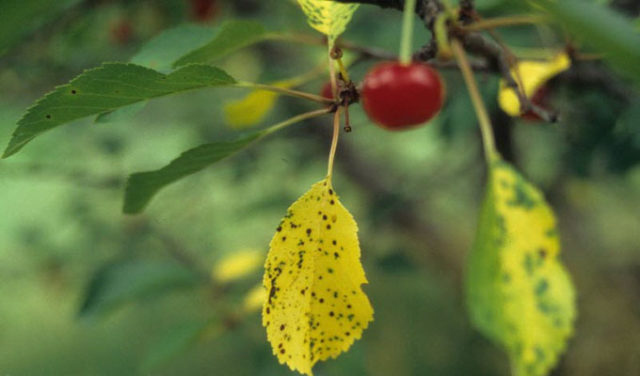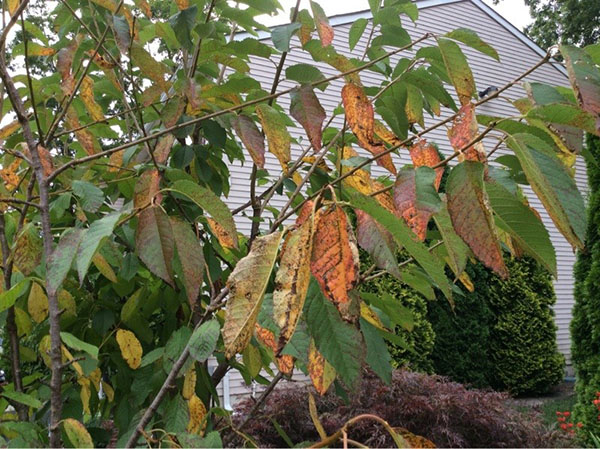Content
- 1 What year does the cherry bear fruit
- 2 How many years does a cherry bear fruit
- 3 Will one cherry bear fruit
- 4 Why does not cherry blossom
- 5 Why cherries do poorly
- 6 What to do if a cherry blossoms but does not bear fruit
- 7 How to make cherries bear fruit
- 8 Preventive measures for abundant fruiting
- 9 Conclusion
Cherries do not bear fruit - many gardeners face this problem. Although the flowering cherry tree is very beautiful, it is still appreciated for its juicy fruits, and it is very unpleasant if it does not come out to wait for them.
What year does the cherry bear fruit
In some cases, the lack of fruiting may be due to the tree being too young. The usual fruiting period for cherries is 3-5 years of life, depending on the variety and growing conditions. Fruits appear on its branches from June to early September - different varieties bear fruit at different times.
How many years does a cherry bear fruit
Another likely reason why cherries have no fruit is old age. After 15 years of life, the productivity of the tree decreases, and fewer fruits are tied on the branches. After 20 years, cherries often completely cease to bear fruit.
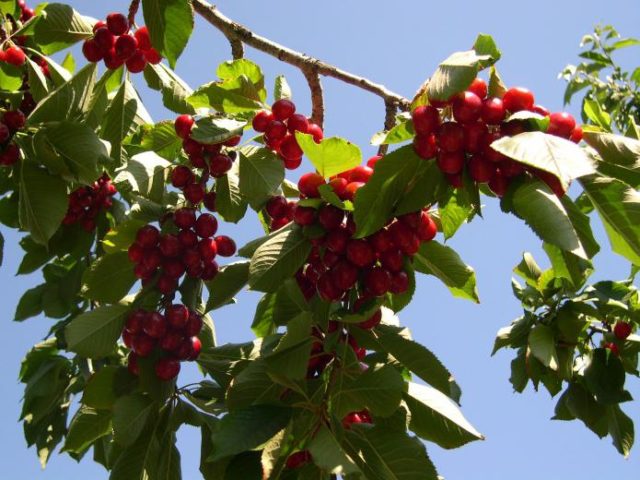
Fruiting does not occur in too young or old cherry trees
Will one cherry bear fruit
Many gardeners plant cherries on the site in a single order, forgetting that most tree varieties are self-fertile. If a variety cannot set fruit without pollinators, then even the best conditions will not make it bear fruit.
One cherry can only bear fruit if it is self-fertile. Self-fertile varieties include Mayak, Lyubskaya, Brunetka, Annushka and some others.
Why does not cherry blossom
Sometimes a cherry tree not only does not bear fruit, but does not even bloom. If flowering is absent in a young plant up to 3 years of age, then there are no special reasons for concern, before entering the fruiting period, this situation is quite normal.
But if the plant is already 5 years old or more, and it still does not bloom, or we are talking about an adult tree that bloomed in previous years, then the gardener needs to worry. There are several main reasons for the lack of flowering in a fruit crop:
- Freezing of flower buds during winter. This happens with thermophilic varieties, as well as with too mild autumn in the previous season. If the weather in October turned out to be excessively warm, then the cherry tree, already almost dormant, can "wake up" again and start growing. Accordingly, with the onset of winter cold, the plant will be more vulnerable, and the flower buds will die from frost. In this case, the next year, the fruit crop will neither bloom nor bear fruit.
- Freezing of buds and buds in the spring. If the usual spring frosts came very late, when the cherry is already fully awake and ready to bloom, then even frosts down to -1 ° C can cause irreparable damage to the tree.
- Lack of minerals and vitamins. Cherries often refuse to bloom in too scarce soil. If the gardener has not been feeding with organics and minerals for a long time, then the tree simply will not have enough strength to form buds, and even more so ovaries.
- Diseases and pests. With poor care, cherries suffer from fungal diseases and harmful insects.Disease spores weaken the vitality of the plant and disrupt the biological cycle, and pests with a serious injury can simply destroy green foliage and cherry buds in mid-spring.
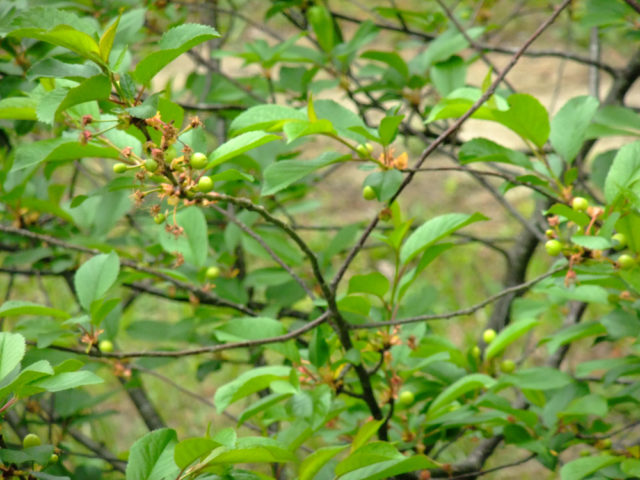
With improper care, the plant may not only fail to bear fruit, but even not bloom.
Improper watering, too coarse pruning or neglect of the annual haircut also lead to a lack of flowering. If a fruit crop refuses to bloom, then first of all it is necessary to solve this problem, only with normal flowering the tree will bear fruit.
Why cherries do poorly
Good flowering is not a guarantee that the plant will bear fruit. Sometimes in spring, the cherry tree blooms very profusely, but the fruit does not set or sheds the ovaries before they have time to develop.
Wrong choice of seedling
One of the reasons why cherries may not bear fruit is the initially wrong choice of seedling. Purchase of a variety that does not match the weather conditions of the region For example, cherries do not bear fruit in the Moscow region, if it is intended for the southern regions, and even more so it grows poorly in Siberia and the Urals. Cold weather in spring interferes with flowering and fruit set, and some of the flower buds die in winter.
Buying a sick or weakened seedling is another reason. If a nursery plant looks bad, has weak roots or is infected with fungal ailments, then you can not expect fruiting from it.
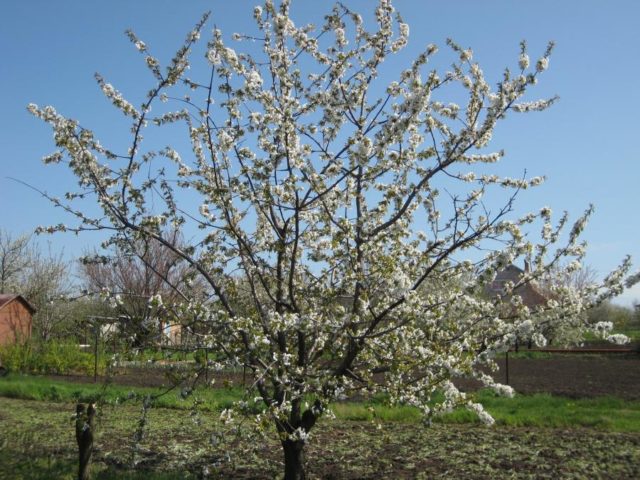
Cherry varieties must be selected according to the region
Improper care
Cherry is considered a hardy and rather unpretentious tree. But careless care still often leads to the fact that the cherry sheds fruit ovaries and refuses to bear fruit:
- If you do not pay attention to top dressing, then the cherry tree will quickly deplete the soil on the site. In this case, the plant will not have the strength to bear fruit. For the good development of the tree, it is necessary to add both organic fertilizing and complex minerals to the soil annually.
- Excessive feeding can also lead to the fact that the cherry will stop bearing fruit. For example, oversaturation of the soil with nitrogen can turn into harm - the cherry will grow actively, but the level of fruiting and winter hardiness will decrease.
- Cherries do not bear fruit unless they are pruned regularly. If the crown of the tree is too thick, then the plant spends all its energy on maintaining shoots and foliage - there are simply no resources left for the ovary and development of berries.
- Improper pruning can limit fruiting. Some gardeners inexperienced cut off the annual shoots of the tree, which are responsible for fruiting, or remove the bouquet buds on biennial or three-year shoots.
- The quality of the shelter for the winter greatly affects the yield. Even cold-resistant varieties must be mulched with a dense layer of organic matter in late autumn, and during severe frosts, the trunk must be covered with spruce branches or roofing material.
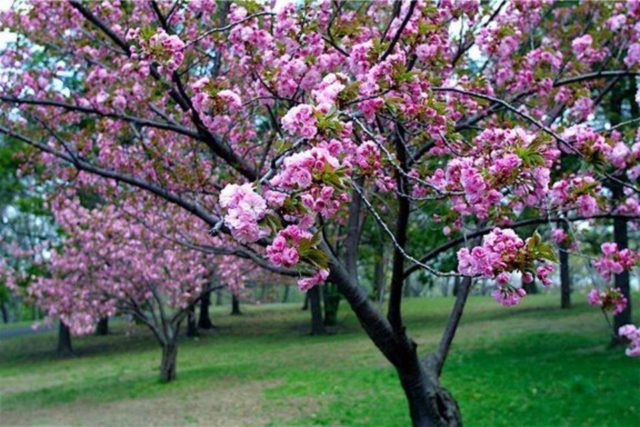
Watering and fertilizing play an important role in the fruiting of horticultural crops
The culture ceases to bear fruit with too abundant or insufficient watering. In the first case, the roots of the plant suffer, due to an excess of moisture, fungal ailments and rot develop. If there is not enough water, then the tree does not receive the required amount of nutrients.
Unfavorable weather conditions
With good care, the plant may also not bear fruit in some years. The reason is unfavorable weather, namely:
- late spring frosts, if negative temperatures return at the moment when the cherry is already preparing for flowering and pollination, then the tree is unlikely to be able to bear fruit;
- warm autumn, even on frost-resistant varieties, flower buds can die in winter if, due to a long warm autumn, the cherry retires too late;
- rainy spring, the process of pollination, and hence fruiting, depends on bees and other pollinating insects that do not fly in rainy weather.
Diseases and pests
Fungal diseases and harmful insects pose a serious threat to the cherry harvest. Most often, cherries stop bearing fruit due to the following ailments:
- coccomycosis - with this ailment, the leaves of the tree become covered with brown spots, turn yellow and fall off, due to which the biological cycle is interrupted and fruiting does not occur;
- moniliosis - the disease affects the formed ovary and leads to its shedding, also with a monilial burn, the foliage and bark of the plant turn brown.
Plants affected by fungi and pests may not bear fruit
Aphids, cherry flies, weevils and sawflies can all cause the plant to not bear fruit. The listed pests eat away the leaves of the cherry tree or destroy the ovary, so you need to carefully monitor their appearance.
What to do if a cherry blossoms but does not bear fruit
If the cherry blossomed, but the fruits did not set, then first of all it is necessary to revise the growing conditions and the care algorithm:
- The plant stops bearing fruit on unsuitable soils. If the soil on the site is too acidic, it must be treated with lime, chalk or ash to achieve soil neutrality. Also, the soil needs to be regularly loosened for good oxygenation and weeds removed in time.
- In the absence of fruiting, you need to pay attention to watering, perhaps the cherry does not have enough moisture, or, on the contrary, the soil is swampy. In the first case, you need to increase the number of irrigations and make sure that the soil remains slightly moistened. In the second, reduce watering and organize good drainage in the area with a tree.
- Every year, the plant must be fed with nitrogenous fertilizers in the spring, and during the flowering period - with potassium and phosphorus. Fertilizers can be applied both mineral and organic, but in the spring you need to fertilize the tree 2-3 times.
Every season for the plant, you need to carry out sanitary pruning - to remove all dry, diseased and too old branches that are no longer involved in the formation of fruits.
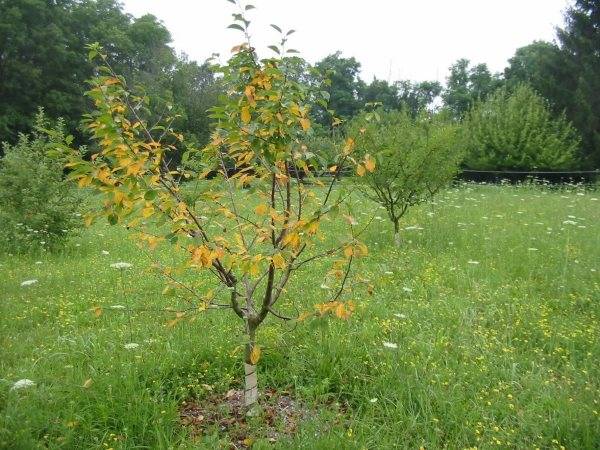
To wait for the fruits from the cherry tree, you need to carefully consider the rules of care.
How to make cherries bear fruit
If all the rules of care are followed, but still the cherry blossoms profusely, but there are no berries, then perhaps the reason is insufficient pollination. There are several ways to solve the problem:
- Plant pollinating varieties near cherries, perhaps the cherries already growing on the site are not suitable for the role of pollinators in terms of flowering time or are located too far from each other. New trees are more likely to improve overall fruiting.
- Additionally attract bees during flowering. If beneficial insects pollinate the garden poorly, then during the cherry blossom season, the trees can be sprayed with honey solution or small containers with honey and jam can be hung on the branches. The sweet smell will attract the bees and the pollination will be better.
Also, before flowering, to improve the ovary, you can spray the cherry with a solution of boric acid - 1 bottle of the product is diluted in 10 liters of water. After flowering, you can spray with stimulants, for example, "Universal ovary".
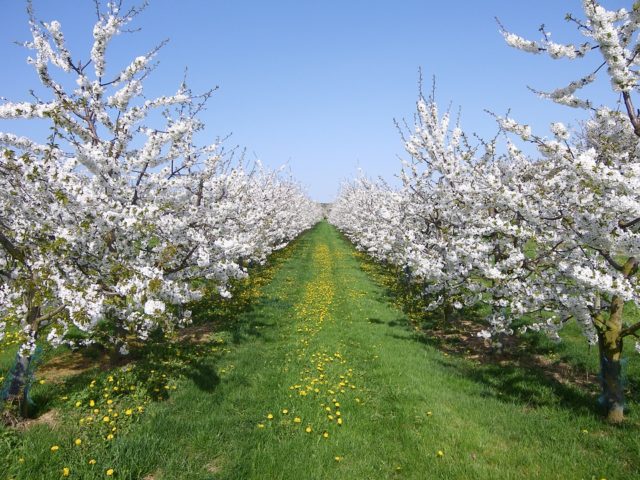
You can improve the quality of pollination artificially - by spraying with sweet solutions
Preventive measures for abundant fruiting
If you follow a few simple rules, you can prevent crop failures and constantly keep cherry fruiting at a good level. The gardener needs:
- choose the right plant seedling when buying - for the northern regions they buy frost-resistant varieties, for the southern ones they are thermophilic, it is also important to acquire a completely healthy plant;
- plant the tree on the correct soil - it should be loose, moderately moist and with a neutral pH;
- water the tree in a timely manner, preventing the soil from drying out or moisture stagnation;
- regularly make potash, nitrogen and phosphorus fertilizers, as well as organic matter;
- plant several cherry varieties close to each other for cross-pollination;
- cut cherries annually so that the plant does not waste energy on feeding extra shoots;
- carefully insulate the cherry before winter, paying special attention to mulching the trunk circle - the mulch layer should be at least 10 cm.
Late flowering cherries show the most stable fruiting. Even if the spring is cold, the last frost has time to end by the time the tree opens its buds.
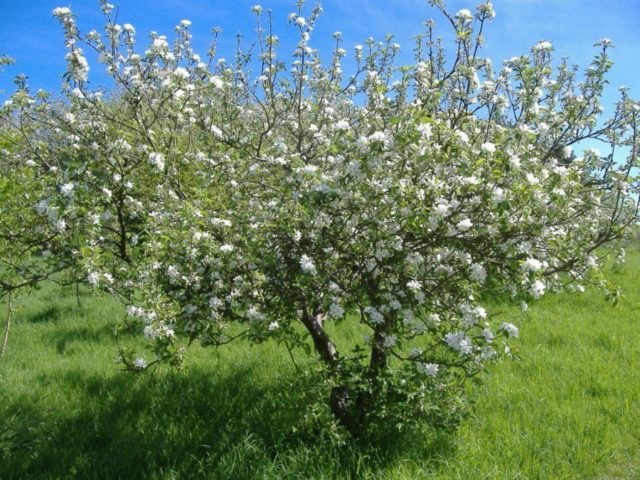
All factors affect the yield of fruit crops - soil quality, top dressing, pruning
Conclusion
Cherries do not bear fruit - many gardeners face this problem, and there are many possible reasons. By following the basic rules of care and by stimulating pollination, yield can usually be returned to a high level.
